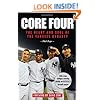



The Captain: The Journey of Derek Jeter Paperback – April 3, 2012

Don't have a Kindle? Get your Kindle here, or download a FREE Kindle Reading App.
Want to know our Editors' picks for the best books of the month? Browse Best Books of the Month, featuring our favorite new books in more than a dozen categories.
Product Details
Would you like to update product info or give feedback on images?.
|
Editorial Reviews
Amazon.com Review
access to Jeter that has spanned some fifteen years to reveal how a biracial kid from Michigan became New York’s most beloved sports figure and the enduring symbol of the steroid-free athlete. O’Connor takes us behind the scenes of a legendary baseball life and career, from Jeter’s early struggles in the minor leagues, when homesickness and errors in the field threatened a stillborn career, to his heady days as a Yankee superstar and prince of the city who squired some of the world’s most beautiful women, to his tense battles with former best friend A-Rod. We also witness Jeter struggling to come to terms with his declining skills and the declining favor of the only organization he ever wanted to play for, leading to a contentious contract negotiation with the Yankees that left people wondering if Jeter might end his career in a uniform without pinstripes. Derek Jeter’s march toward the Hall of Fame has been dignified and certain, but behind that leadership and hero’s grace there are hidden struggles and complexities that have never been explored, until now. As Jeter closes in on 3,000 hits, a number no Yankee has ever touched, The Captain offers an incisive, exhilarating, and revealing new look at one of the game’s greatest players in the gloaming of his career.
Photos of Derek Jeter from The Captain
(Click on Images to Enlarge)
 Derek Jeter and teammates wave their caps to the crowd after Jeter delivered his postgame speech on Yankee Stadium’s final night. |  The captain salutes the fans after breaking Lou Gehrig’s franchise record for hits. |  The shortstop’s signature play – the jump throw from the hole – from start to finish. |
Photos courtesy John Angelillo/UPI
Amazon Exclusive: A Q&A with Author Ian O'Connor

Q: Why did you feel compelled to write a biography of Derek Jeter?
A: As I say in the introduction to The Captain, the answer is found in my son’s closet, a mini-warehouse of youth baseball jerseys graced by the frayed number 2. With Derek Jeter nearing the end of his iconic career, not to mention a milestone (3,000 hits) no New York Yankee has reached, I thought it was the right time to do a head-to-toe examination of Jeter’s mass appeal. He is the DiMaggio of his time, a beloved but distant figure. My goal was to humanize Jeter. I wanted to paint a public portrait of a private man while celebrating his dignified approach and explaining why his number 2 is number 1 in the closets of kids everywhere.
Q:How did you gather all the material in The Captain?
A: I’ve covered Jeter’s entire career as a newspaper and Internet columnist in the New York market, so I had a strong base of firsthand observations and knowledge and one-on-one and group interviews with Jeter to work with. I also conducted more than 200 interviews exclusively for this book, including conversations with Jeter and past and present teammates, coaches, friends, opponents, teachers, scouts, executives, admirers, and detractors. (I define his detractors as admirers willing to discuss the shortstop’s human flaws.)
Q: What is your favorite anecdote in the book from Jeter’s early years as a Yankee?
A: One of my favorites involves the period before Derek was drafted. As a child he started telling his parents and others he would someday play shortstop for the New York Yankees, and as a teenager he predicted to some that he would marry Mariah Carey (well, he almost went 2 for 2). But the surreal twists and turns of the draft of ’92, when Jeter dropped into the Yankees’ lap as the sixth overall pick, lends credence to the notion he was meant to be a Yank. Houston rejected the advice of its lead Jeter scout, a former Hall of Fame pitcher for Detroit named Hal Newhouser, who resigned because the Astros didn’t pick Derek at number 1 (they took college star Phil Nevin instead). Cincinnati scouting director Julian Mock rejected the advice of his own people and decided in the middle of a draft-day jog to select a college outfielder from central Florida (Chad Mottola) instead of the high school shortstop from Kalamazoo (Jeter) at number 5. To this day, Derek swears he was so convinced he was going in the top five of the draft, he didn’t even know that his dream team, the Yankees, were picking sixth. He knows now... I also enjoyed discovering how Cal Ripken Jr.’s decision to shake a young boy’s hand in 1993 ultimately put twelve-year-old Jeffrey Maier in the Yankee Stadium stands in 1996, when Maier deflected Derek Jeter’s home-run ball into American League Championship Series lore and helped end Baltimore’s season and Ripken’s indelible reign at short.
Q: Jeter is often portrayed as the perfect athlete. Is he perfect?
A: Jeter is about as close to perfect as a superstar athlete can get, but no, he is not an infallible player or person. As a product of parents who raised him on the strict terms of behavioral contracts he was compelled to sign, Jeter never put himself or his team in an embarrassing position. But he’s been overly sensitive to criticism, he’s terrible at forgiving and forgetting those he believes have slighted him, and at times he could have been a better captain to Alex Rodriguez, who craved Jeter’s approval in his early seasons as a Yankee. Jeter didn’t give it.
--This text refers to an out of print or unavailable edition of this title.
Review
"Jeter is the prince, the good son, the tireless worker. O’Connor uses baseball lore and the tropes and rhythms of folktales to limn Jeter’s family life and early career...essential for Yankees fans." — Booklist
"O’Connor peppers the bio with enough hidden gems about the notoriously private ballplayer to make this the most thorough and intriguing work on Jeter so far. And O’Connor’s ability to reconcile Jeter the man with Jeter the ballplayer means that even Red Sox fans may enjoy this bio." — Publishers Weekly
"The most complete account yet of this signal player's life and career . . . Insightful about Jeter's minor league days and touching on his personal life, The Captain tantalizes with predictions about possible position changes and the length of Jeter's career. An excellent selection for those interested in baseball generally and in pinstripes particularly." — Library Journal
"Long after Derek Jeter is inducted into the Hall of Fame, Ian O’Connor’s work will be viewed as the definitive biography of the captain. Jeter has always managed to keep it simple, but as O’Connor shows, the shortstop is a complicated superstar." — Buster Olney, author of How Lucky You Can Be and The Last Night of the Yankee Dynasty
"Ian O’Connor is an ideal biographer for Derek Jeter. Ian is the same kind of thorough pro." — Tom Callahan, best-selling author of Johnny U
"Derek Jeter is undoubtedly the most talked about, argued about, cheered, booed and ultimately respected baseball player of his generation. And as public a figure as he has been, he is in many ways the least known. That changes now as Ian O’Connor, one of the best sportswriters anywhere, goes deep and does what no one has quite been able to do: tell us a bit about who Derek Jeter really is." — Joe Posnanski, author of The Machine
"For years we’ve been telling young ballplayers to play and behave like Derek Jeter. Now we can tell them to read Ian O’Connor's The Captain. Finally, we have an inside look at the worthy successor to Ruth, Gehrig, DiMaggio and Mantle." — Dan Shaughnessy, author of Fenway and Senior Year
More About the Author
O'Connor is also the author of The New York Times' bestseller "Arnie & Jack: Palmer, Nicklaus, and Golf's Greatest Rivalry," a columnist with ESPNNewYork.com, and a radio host on 1050 ESPN in New York.
Three times O'Connor has been named the No. 1 columnist in America in his circulation category by the Associated Press Sports Editors, and seven times he has placed among the top five nationally. O'Connor's work has earned dozens of national and regional awards, including the Society of Professional Journalists' prestigious Sigma Delta Chi Award at the National Press Club in Washington, D.C.
O'Connor has won contests conducted by the Golf Writers Association of America, the National Association of Black Journalists, the Basketball Writers Association of America, and the Football Writers Association of America.
O'Connor has been a columnist for The New York Daily News, USA Today, Foxsports.com, The Journal News and The Record, and has written for The New York Times and Star-Ledger.
A 1986 graduate of Marist College, O'Connor is a frequent guest on national ESPN TV programs. He lives in New Jersey with his wife and son.
Customer Reviews
Most Helpful Customer Reviews
Yet Jeter is still only human and O'Connor is perceptive of his subject's faults. In particular, Jeter is portrayed as being both overly sensitive to criticism and ruthlessly unforgiving towards those he perceives as having wronged him or violated his friendship. The latter trait is especially highlighted in the second-half of the book, which is dominated by the complex relationship between Jeter and Alex Rodriguez. O'Connor, not unfairly, concludes Jeter failed A-Rod in his role as Yankee captain by holding a grudge over passive-aggressive comments Rodriguez had made years earlier and not extending to the third baseman during his early struggles in New York the same public support Jeter had given Chuck Knoblauch and Jason Giambi during their adversities. The chinks-in-the-armor are relatively trifling and stand out only because they contrast, however slightly, with what O'Connor astutely describes as Jeter's almost unfailing instinct to do "the right thing at the right time.Read more ›
He goes back to the story of Jeter's grandparents and the work ethic that was always brought about by Jeter's grandfather. This ethic was later drilled into Derek by his grandfather. His mother Dot was also heavily influenced by her father and married Derek's father at a time when interracial marriages were still considered "shocking." Derek also bonded closely with his sister and even defended her honor a few times.
Derek was from the start always sure that he would be a Yankee shortstop and marry Mariah Carey. He lived his entire childhood and teenage years with this dream. Each time something would go wrong with him it seemed like the perfect coach or mentor came along to right him. He was the top high school player and the year the Yankees drafted him they had the six pick. O'Connor unfolds how the draft went down in such a way that even though the reader knows where Derek wound up, you still have your doubts as the suspense of the picking builds.
Even when Derek finally decides on the Yankees, the author makes you so sure that he will be Bill Freehan's shortstop at the University of Michigan.
Very much like Mickey Mantle, Derek had an incredibly rough first year in the minors and would run up big phone bills calling home crying, doubting his decision to bypass college and feeling like a total washout.Read more ›
~
I'm a Yankee fan, and Derek Jeter is my favorite player. So maybe I was predisposed to like this book. On the other hand, if author Ian O'Connor didn't get his facts straight, I'd know, and call him on it. But O'Connor did an excellent job of research, and adding in quotes and stats and examples without ever getting wordy or boring or redundant. He gives us a peek behind the curtain of Jeter's life in chronological order and keeps it interesting throughout. This despite the fact that Jeter has not exactly led a controversial life.
We're used to the scandalous biography, the tell-all, the skeletons dragged out of the closet. This book doesn't have that. Because there are no skeletons in Jeter's closet. This is a book about one person's lifelong work to achieve a dream: to play shortstop for the New York Yankees. Okay, so maybe a lot of people have that dream. The difference is Jeter actually accomplished it--and in a big way. This is his story.
There are thirteen chapters, an introduction, and an epilogue. O'Connor covers all the bases (pardon the pun), and is such a good writer that the story flows along nicely, without getting bogged down with boring details, or unnecessary tangents. He even makes the second chapter, "The Draft," exciting (even though we already know the outcome), as he chronicles how Jeter lasted until the sixth pick of the 1992 draft, when the Yanks were finally able to nab him. Only once did O'Connor get a little off-track; that's when he spent too long on the Jeffrey Maier incident.Read more ›












